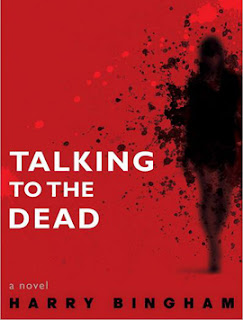It's not the crime investigation being carried out in Wales that will captivate readers picking up a series debut by author Harry Bingham. The protagonist, Detective Constable Fiona Griffiths, is the more compelling mystery. She isn't like other detectives working the case. She suffers from a psychosis.
Sometimes it thrives on her, causing her to second guess herself. But other times she thrives on it, taking pride in her reputation for being odd, intense and unpredictable. Never mind that the latter quality often causes her chief to distrust her otherwise stellar police work. She knows what works.
From his perspective, however, it leaves him in a quandary. He never knows which Griffiths might show up — the hardworking sensible one who outperforms her peers or the reckless one that will ignore orders and police protocol to elicit a reaction, chase an unconnected lead, or risk her life.
That doesn't account for all of it. Griffiths has a hard time reading other people's social cues and frequently has to feign emotion. To hear her tell it, she relates to the dead better. While they don't really talk to her per se, she finds comfort in talking to them anyway and will even lie down next to them.
Talking To The Dead introduces an unforgettably flawed character.
What makes Griffiths so captivating as a character is that she wants so desperately to be normal even though she knows that she will never be normal. She is afflicted with a rare but genuine psychological condition that can almost be confused with being a sociopath despite its core attributes being depression and psychosis.
It has a name and is defined in the back of Bingham's book, but giving it up here would spoil the best part of discovering an incredibly deeply drawn character. Suffice to say it is similar to a manifestation of depersonalization, but much more unforgiving. The fact that Griffith is a detective is compelling.
"Most mystery stories have tough, middle-aged men as their heroes — people of weight and substance," says Bingham. "I wanted the opposite. Fiona is a woman, she's physically small, she's very junior in rank. She works for the South Wales Police, which is hardly right there at the centre of things."
Given that it isn't in the "centre of things," it might be why the South Wales Police overlooked the two-year gap in her past after Cambridge. While most people assume she had a breakdown, her father's history with law enforcement helped her gain an edge. Besides, she almost immediately turns out to be a crack investigator, proving that almost anyone can eventually recover to lead normal and productive lives.
Except, Griffiths hasn't really recovered. As she secretly puts it, she is trying to return to Planet Normal. And although police work would seem like an odd place to find normal, Griffiths is drawn to it, much like the primary crime scene in the book.
The murder scene is grisly, but not necessarily unusual. A young prostitute has been murdered, apparently of a forced heroin overdose. Her young daughter was murdered too, a traumatic head injury. Although Griffiths is not initially assigned to the case, the police found a bank card that belongs to a affluent man who was killed in an plane accident a few months prior. He is tied to an embezzlement case she is supposed to be giving her full attention.
A few graphs about author Harry Bingham.
Although not Welsh, author Harry Bingham says he spent much of his childhood in South Wales. He loves it because Cardiff has what he calls a brilliant double life, one that thrives in a relatively new and provincial city despite much of Wales being a place of medieval castles and remote countryside.
Most of the book takes place in the city, but there is a sense of the old and new worlds in Bingham's writing. Originally a banker, Bingham eventually turned his attention to writing instead, opening a writer's workshop to help aspiring writers while penning dozens of contemporary and nonfiction work. He has also written for dozens of newspapers in the United Kingdom.
Talking To The Dead Digs Up 7.8 On The Liquid Hip Richter Scale.
There are times that the novel starts to lose some of the intense energy that the character Griffiths gives it, but that stands to reason. The crime and investigation is more about becoming familiar with her as a flawed heroine, always trying to do the right thing but always in jeopardy at the same time. That makes the occasional mystery and thriller a little less interesting compared to how she reacts to it along the way.
Even so, Bingham has proven to be as adept at fiction as nonfiction. Griffiths is easily a series to watch. But even without a series commitment, she is still well worth experiencing at least once. You can find Talking to the Dead: A Novel by Harry Bingham on Amazon. You can also order the book from Barnes & Noble or download it for iBooks. The audiobook, beautifully narrated by Siriol Jenkins, is also available.
![Liquid [Hip]](https://blogger.googleusercontent.com/img/b/R29vZ2xl/AVvXsEjAFBQPqS7J0-rrttNoRYSsuwIePPZf4Nq6sqDioK1zzVQXJIQXKzq_NVNI4n6h3inuRQFBKOcJeZeSufkdHHIOxbSWyBjTjTxgKEQGyPzdwvkEEeECh4bI5YEGk4RWGUINSd7vulPQsCA/s1600-r/liquidhip.jpg)


